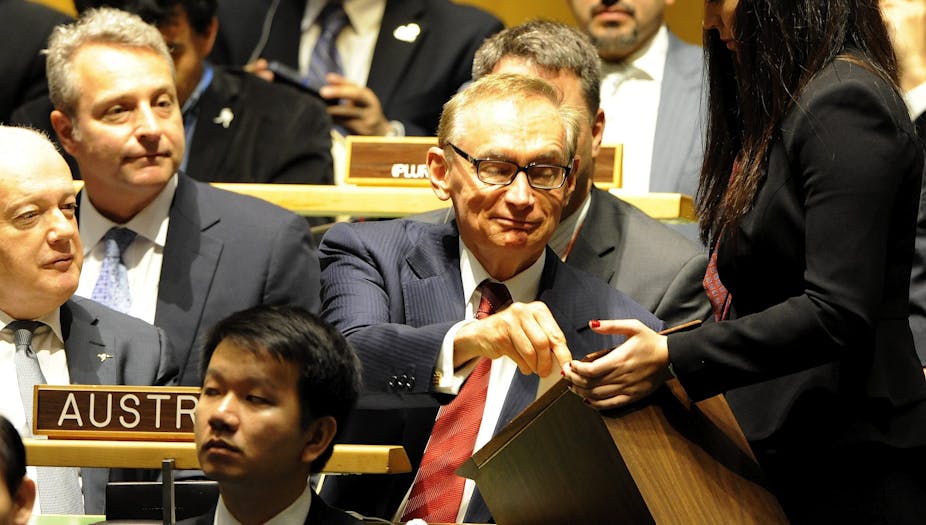Now that Australia has taken its seat on the UN Security Council, it is worth considering how we might make a difference. Former diplomat Bruce Haig has recently dismissed Australia’s new role as chair of the sanctions committee as being a waste of resources, so how might we better focus our efforts during our two-year tenure?
Australia can consider another way in which we can make a difference. We can do this by applying a human rights lens to the work of the security council, drawing a close connection between its peace and security work and the protection and promotion of human rights.
Some will strenuously assert that Australia always considers human rights in its deliberations at the United Nations as well as elsewhere. That is, of course, more easily said than done. Australia should go beyond mere platitudinous statements and adopt a vigilant position.
That position should tell others on the security council, and the rest of the international community, that Australia sees a firm and continuing link between the values of security and those of human rights, each being of equal importance and capable of bolstering each other. For example, if we want to see the UN’s peace and security efforts become more sustainable, then it is essential that adequate attention be given to the underlying causes of, and any rights violations within, conflict situations. A good example would be the impact that Israeli economic policies towards Palestinians in the Gaza Strip are having upon the conflict between them.
Australia has worthy international credentials in peace, security and human rights, courtesy of our regional peacekeeping work and general support for the Human Rights Council. But our human rights record is not unblemished, and Australia should approach this new role in the spirit of improving our human rights image in the international community. We must make it clear to all that we see the protection and promotion of rights as an essential prerequisite to real security, both in our region and globally.
So what do we mean by applying a human rights lens its work on the security council?
Australia must use this opportunity to promote human rights in their broadest sense. This is more than just addressing “freedom and liberty rights” or advocating for democracy and an independent judiciary.
The debate needs to give attention to subsistence rights, such as rights to food, water, adequate housing as well as education, that are all too often neglected, if not violated. Australia should take a lead role in highlighting possible socio-economic causes of conflicts such as the denial of livelihood through environmental degradation (as in the Niger Delta of Nigeria), the limitation if not denial of the rights to education for minority groupings (as with the Roma people in Belarus) and the denial of adequate housing (as with the forced eviction of peoples as is currently occurring, for example, in Cambodia and Brazil). If Australia is prepared to expose any human rights violations, without fear or favour, its image in the international community can only be enhanced. As well, such efforts may even serve to improve the security council’s responsiveness to humanitarian crises.
Philip Lynch has suggested “practical steps” such as requesting human rights analyses and impact statements in all reports to the security council.
Giving our seat a strong human rights focus should not, however, be seen as divorced from our other international human rights work or, importantly, from the Australian government’s approach to dealing with human rights concerns at home. These must include addressing the rights of the physically and intellectually disabled, poverty issues generally and the economic plight of indigenous peoples in both remote and urban areas in particular, the marginalised position of refugees and asylum seekers and the promotion of gender equality.
You never know, if Australia adopts a strong and independent human rights approach to its work on the security council, this may embolden the government to consistently apply principled approaches when dealing with the vulnerable and marginalised in our own country.

